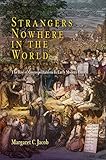Strangers Nowhere in the World : The Rise of Cosmopolitanism in Early Modern Europe / Margaret C. Jacob.
Material type: TextPublisher: Philadelphia : University of Pennsylvania Press, [2016]Copyright date: ©2006Description: 1 online resource (200 p.) : 10 illusContent type:
TextPublisher: Philadelphia : University of Pennsylvania Press, [2016]Copyright date: ©2006Description: 1 online resource (200 p.) : 10 illusContent type: - 9780812223873
- 9780812294231
- HN
- online - DeGruyter
- Issued also in print.
| Item type | Current library | Call number | URL | Status | Notes | Barcode | |
|---|---|---|---|---|---|---|---|
 eBook
eBook
|
Biblioteca "Angelicum" Pont. Univ. S.Tommaso d'Aquino Nuvola online | online - DeGruyter (Browse shelf(Opens below)) | Online access | Not for loan (Accesso limitato) | Accesso per gli utenti autorizzati / Access for authorized users | (dgr)9780812294231 |
Browsing Biblioteca "Angelicum" Pont. Univ. S.Tommaso d'Aquino shelves, Shelving location: Nuvola online Close shelf browser (Hides shelf browser)

|

|

|

|

|

|

|
||
| online - DeGruyter Women's Human Rights and Migration : Sex-Selective Abortion Laws in the United States and India / | online - DeGruyter Agriculture and the Rural Economy in Pakistan : Issues, Outlooks, and Policy Priorities / | online - DeGruyter European Civil Society and Human Rights Advocacy / | online - DeGruyter Strangers Nowhere in the World : The Rise of Cosmopolitanism in Early Modern Europe / | online - DeGruyter Playwriting Playgoers in Shakespeare's Theater / | online - DeGruyter After Europe / | online - DeGruyter Surviving Slavery in the British Caribbean / |
Frontmatter -- Contents -- Introduction -- 1. Censors, Inquisitors, and Cosmopolites -- 2. Alchemy, Science, and a Universalist Language -- 3. Markets Not So Free -- 4. Secrecy and the Paradox at the Heart of Modernity (the Masonic Moment) -- 5. Liberals, Radicals, and Bohemians -- Epilogue -- Notes -- Index -- Acknowledgments
restricted access online access with authorization star
http://purl.org/coar/access_right/c_16ec
The mingling of aristocrats and commoners in a southern French city, the jostling of foreigners in stock markets across northern and western Europe, the club gatherings in Paris and London of genteel naturalists busily distilling plants or making air pumps, the ritual fraternizing of "brothers" in privacy and even secrecy-Margaret Jacob invokes all these examples in Strangers Nowhere in the World to provide glimpses of the cosmopolitan ethos that gradually emerged over the course of the seventeenth and eighteenth centuries.Jacob investigates what it was to be cosmopolitan in Europe during the early modern period. Then-as now-being cosmopolitan meant the ability to experience people of different nations, creeds, and colors with pleasure, curiosity, and interest. Yet such a definition did not come about automatically, nor could it always be practiced easily by those who embraced its principles. Cosmopolites had to strike a delicate balance between the transgressive and the subversive, the radical and the dangerous, the open-minded and the libertine. Jacob traces the history of this precarious balancing act to illustrate how ideals about cosmopolitanism were eventually transformed into lived experiences and practices. From the representatives of the Inquisition who found the mixing of Catholics and Protestants and other types of "border crossing" disruptive to their authority, to the struggles within urbane masonic lodges to open membership to Jews, Jacob also charts the moments when the cosmopolitan impulse faltered.Jacob pays particular attention to the impact of science and merchant life on the emergence of the cosmopolitan ideal. In the decades after 1650, modern scientific practices coalesced and science became an open enterprise. Experiments were witnessed in social settings of natural inquiry, congenial for the inculcation of cosmopolitan mores. Similarly, the public venues of the stock exchanges brought strangers and foreigners together in ways encouraging them to be cosmopolites. The amount of international and global commerce increased greatly after 1700, and luxury tastes developed that valorized foreign patterns and designs.Drawing upon sources as various as Inquisition records and spy reports, minutes of scientific societies and the writings of political revolutionaries, Strangers Nowhere in the World reveals a moment in European history when an ideal of cultural openness came to seem strong enough to counter centuries of chauvinism and xenophobia. Perhaps at no time since, Jacob cautions, has that cosmopolitan ideal seemed more fragile and elusive than it is today.
Issued also in print.
Mode of access: Internet via World Wide Web.
In English.
Description based on online resource; title from PDF title page (publisher's Web site, viewed 24. Apr 2022)


